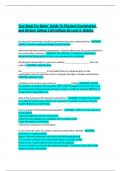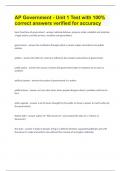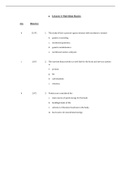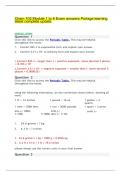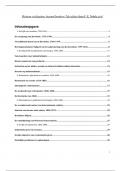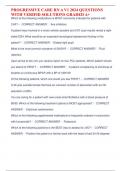Week 1
Introduction to Consumer and Economic Psychology
1) Introduction to Economic Psychology: The science of economic mental life and behaviour
- Paradigm shifts: fundamental changes in perspective
- Early 20th century: shift from introspectism’s reliance on self-reports of mental
activity to behaviorism
- Cognitive revolution: mid-1950s
- Defining characteristics of economic psychology:
➔ The science of economic mental life and behavior, branch of applied psychology
➔ The study of “how individuals affect the economy and how the economy affects
individuals”
➔ An interdisciplinary field of study
- Origins of economic psychology
- Traced back to Greek philosophers, more recently 17th century economics
→ Adam Smith (An Inquiry into the Nature and Causes of the Wealth of Nations; The
Theory of Moral Sentiments → considered as starting point of econ psych)
→ concepts explored: self-love, importance of being able to take other’s roles (social
interactions necessary for trading)
→ claimed that happiness & well-being derived from the happiness + well-being of
others
→ explored sympathy, emotions + virtues in general
- Jeremy Bentham further developed concept of self-love → utility as the permanent
hedonistic pursuit of pleasure and avoidance of pain + calcs to maximize utility
- John Stuart Mill: Model of homo economicus
→ A rational individual who makes rational decisions that maximize utility, is self-
interested, capable of learning from experience, and with stable, consistent
preferences
- Believed economics should be based on obvious psychological law
- W. Stanley Jevons: derived marginal utility theory from Mill’s model + adding
deductive math to establish basic assumptions
- Karl Menger + colleagues founded Austrian Psychological School/Marginalist School
→ emphasized importance of subjective elements in economy
- Argued that…
➔ Psychological analysis ought to provide foundation of economics
➔ only introspection as a method is necessary to examine needs + attributions of
value
- 1881 first mentions of term/link made between psychology and economics by
Gabriel Tarde
- Same time as psychology was being established as a science (Wilhelm Wundt,
Introspectionist School of Leipzig)
- Tarde (social psychology pioneer) suggested how imitation, repetition and
innovation could be used to analyse social and economic behavior
- Thorstein Veblen (social thinker), 1899: criticized excessive life-style of American
millionaires → argued that basic human drive was towards social & economic status
, 2
+ means to achieve these could vary according to time and social and economic
conditions
- Suggested that psych, biology, political science + history should be considered when
analyzing economic phenomena
- Economic psychology tended to be classified as consumer psychology
- Association of Economic Psychology (1916): led by psychs and businessmen
interested in using psychology for practical purposes (recruitment, selection,
publicity + sales)
- Modern econ psych starts mid-20th century w/ George Katona
→ a lot of economists predicted major recession after WWII, Katona predicted that
ppl would engage in buying goods, spend money and enjoy life after war according
to surveys + he was right
- 1952: Katona created Index of Consumer Sentiment (ICS), assesses ppl’s economic
expectations
- Herbert Simon deemed homo economicus as solely being assumptions (no empirical
data available)
- Business ppl didn’t wanna maximize profit but rather set target levels above which
they would be satisfied that their business would be more than viable
→ motivated to reach an aspiration level
- Satisficing: Refers to simple decision rules or heuristics in which aspiration levels
rather than the goal of maximation play a major role
- Proposed alternative view to rational economic man: bounded rationality
- Development in economic decision theory: choices btw alternative courses of action
whose outcomes are distributed over time (e.g., spending now vs saving for pension)
→ intertemporal choices
- Koopmans (1960) developed discounted utility model: other things being equal,
someone should have a time preference for a positive event sooner rather than later
- Behavioral Economics: Uses psychological concepts and theories to better
understand economic behaviour
- First interdisciplinary collab in behavioural economics: research showing that
economic behaviour can violate homo economicus’ (expected) utility maximization
principle bc ppl’s evaluation of the same good can vary
- Endowment effect: explained in terms of prospect theory’s value function
➔ Economic outcomes are evaluated as gains or losses relative to a reference point
➔ People are loss-averse
- Owners frame the evaluation of the good from a different reference point to non-
owners
- Other framing effects: same decision alternatives viewed from different reference
points
- Behavioural economics had impact on public policy → donating organs standard,
option of not doing it, increased frames of the opposite
- Similarities between behavioural economics & economic psychology
➔ Both acknowledge many of the same historical roots (e.g., Herbert Simon is
founding parent)
➔ Both are empirical sciences
➔ Both are applied sciences motivated to develop effective support for individuals
+ society in economic domain
, 3
- Differences between behavioural economics & economic psychology
Behavioural Economics Economic Psychology
- dominated by approach to - Draws on contemporary
psychology of judgement + psychology → includes primary
decision making (Tvsersky + goal of modelling mental life
Kahneman) - employs a more eclectic range of
- school with broader research methods (incl. studies of
interdisciplinary endeavor behaviour in realistic,
- narrow range of methods should hypothetical scenarios)
be scientific, requires data to be - allow deception of research
either from real economic world participants (adhered to with
or to be motivated by meaningful appropriate ethical code)
incentives - accept nudge approach to policy
- deception in research - quantitative research methods
unacceptable dominate
- adopts distinctive political
position concerning role of
interventions to effect
behavioural change (libertarian
paternalism)
- ppl in power use findings to
change decision environment so
that ppl are more likely to make
decisions that those in power
deem to be in the ppl’s best
interest
- Money: A scale of economic value used across society to monitor and record
balances of credit and debt that are transferable to third parties
→ money as a tool to facilitate practicalities of trades
- In economic theory: money seen as interchangeable tool usable in any economic
transaction
- Depending on how ppl categorize money its not always interchangeable
- Money associated with feelings of agency, independence and with both negative
values of selfishness and positive values of fairness and reciprocity
- Judging what is cheap/expensive is fundamental process underlying consumer
behaviour
➔ Inflation expectations affect individual + household economic behaviour
➔ Surveys of inflation expectations used to inform monetary policy
- Deeper notion of financially capable citizen who makes informed choices including:
➔ Appropriate knowledge and cognitive skill
➔ Ppl’s reflective automatic motivations and the social and physical opportunities
that their environment provides for capable action
- Household saving + borrowing important to economists bc in total they influence
macro-economy
, 4
- Income drives savings + economic analyses say that effect of individual psychological
factors cancel out at the overall saving level
- Individual expectations of future income predict overall savings and borrowing
- Materialistic values, less active money management, time orientation, motives for
saving and attitudes towards saving associated with borrowing
- Investors trade too often, associated with overconfidence or thrill-seeking, sell rising
shares too soon and falling shares too late
- Money as incentive for volunteer work not straightforward, organizations usually
focus on the role of public recognition by awards
- Entrepreneurs may be susceptible to cognitive biases
- Decrease of fluid cognitive abilities (e.g., information processing speed) results in
older adults having greater difficulties as the complexity of decisions increase
- Singularity effect: Donations are greater when the target of help is an identifiable
individual rather than a group
- Poverty: Defined as a gap between the material resources people need to live and
those they actually have, clearly has a negative impact on subjective well-being
Chapter 2: Economic Decision-making
- Price of a good depended on the human effort → depending on number of labour
hrs it takes to produce it
- Marginal revolution: Construe price as the marginal value of a good instead of its
average value
→ the marginal value of some good decreases as its total amount increases (e.g.,
stones vs diamonds)
- Pricing follows from the decision-maker’s goal to maximize happiness and/or
satisfaction
→ ppl are utility-maximizers
- Solution to St. Petersburg Paradox (according to Bernoulli, 1954)
➔ Suggested distinguishing the utility (desirability or satisfaction) of wan outcome
from its monetary amount (value) and assuming a principle of decreasing
marginal utility
➔ Marginal utility: the utility obtained from an increment of some good
➔ Marginal utility decreases as the quantity consumed increases → each additional
amount of a good consumed is less satisfying than the previous one
➔ Logarithm of the amount: the sum of expected utilities reaches a limit and the St.
Petersburg game is worth the equivalent of about 4.00. The rational gambler,
then, would pay any sum less than 4.00 to play.
➔ Decreasing marginal utility became yardstick for reason and rationality
➔ Sum of payoffs of all the possible outcomes; EV is an infinite large sum

